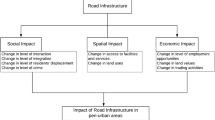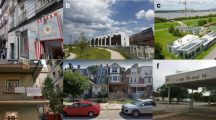Abstract
This article examines the attempted illegal forced eviction of residents in Old Fadama, Accra’s largest informal settlement. Firstly, it reviews the most recent newspaper articles and official government documentation, to demonstrate the instrumental portrayal of the settlement and its residents as nuisance, dangerous and unsanitary. It shows that the normative discourse of ‘squatters’ and ‘informality’ used by the municipal authorities situates Old Fadama’s residents within the sphere of illegality. As a result, residents are physically situated within, but conceptually outside of the boundaries of Ghanaian society, which serves to justify the eviction to the wider constituency, especially as the accompanying propaganda has resulted in the settlement being a ‘no-go’ area for other residents in Accra due to fear of insecurity. Secondly, it explores the complex web of social and economic relationships between the settlement and Accra’s wider urban fabric that renders the simple dichotomies of planned and legal versus unplanned and illegal unfeasible. It argues that situating the emergence and expansion of Old Fadama in Ghana’s wider national migration patterns, as well as the country’s housing and urban planning policy history, and uncovering the settlements multiple relationships with Accra and Ghana’s governing structures as well as the city’s multiple economic networks provide an alternative reading of Old Fadama’s development and growth than that usually allowed for within this discourse of illegality and squatting used by the local authorities.

Similar content being viewed by others
Notes
An international NGO working towards the fulfilment of the right to housing for everyone
The terms forced eviction, involuntary displacement and forced removal will be used interchangeably throughout this paper
The city has an estimated population of 1,7 million. However, the actual population figure is likely to be significantly higher due to the prevalence of informality that is not captured in official census data.
The terms ‘National Territory’ and ‘National Capital Territory’ (NCT) are alternative terms for Accra
References
Arku, G. (2009). Policy review: housing policy changes in Ghana in the 1990s. Housing Studies, 24(2), 261–272.
Asiedu, A., & Agyei-Mensah, S. (2008). Traders on the run: activities of street vendors in the Accra Metropolitan Area, Ghana. Norwegian Journal of Geography, 62(3), 191–202.
Boadi, K. O., & Kuitunen, M. (2002). Urban waste pollution in the Korle Lagoon, Accra, Ghana. The Environmentalist, 22, 301–309.
Brenner, N., & Theodore, N. (2002). “Cities and the geographies of actually existing neoliberalism”. In N. Brenner, N. Theodore (Eds.), Spaces of neoliberalism, urban restructuring in North America and Western Europe. Antipode Bookseries. Oxford: Wiley-Blackwell.
Brenner, N., Peck, J., & Theodore, N. (2009). Neoliberal urbanism: models, moments, mutations. SAIS Review, 29(1), 49–66.
COHRE (2004). A precarious future: the informal settlement of Agbogbloshie, Ghana. Resource Document. http://www.google.com/url?sa=t&rct=j&q=&esrc=s&source=web&cd=1&ved=0CE8QFjAA&url=http%3A%2F%2Fwww.unhabitat.org%2Fpmss%2FgetElectronicVersion.asp%3Fnr%3D2353%26alt%3D1&ei=QSPaT43VOpCF-waA6NCKCA&usg=AFQjCNEg3Um7bv3NAYR6KJ_NWdopU-Jb7w&sig2=_eye60ZNKtQdfKPksQZ8Bg. Accessed 17 June 2009
COHRE (2006a). Forced evictions: violations of human rights 2003–2006, Resource Document. http://www.cohre.org/globalsurvey. Accessed 15 June 2009.
COHRE (2006b). Putting people last: forced evictions from Digya National Park. Resource Document. http://www.cohre.org/sites/default/files/ghana_-_putting_people_last_-_forced_evictions_from_digya_national_park_oct_2006.pdf. Accessed 17 June 2009.
Du Plessis, J. (2005). The growing problem of forced evictions and the crucial importance of community based, locally appropriate alternatives. Environment and Urbanisation, 17, 123–134.
Grant, R. (2006). Out of place? Global citizens in local spaces: a study of the informal settlements in the Korle Lagoon Environs in Accra, Ghana. Urban Forum, 17(1), 1–24.
Grant, R., & Oteng-Ababio, M. (2012). Mapping the invisible and real “African” economy: urban e-waste circuitry. Urban Geography, 33(1), 1–21.
Harvey, D. (2000). Spaces of hope. Edinburgh: Edinburgh University Press.
Harvey, D. (2008). The right to the city, New Left Review 53.
Homeless International a. Settlement story ‘Old Fadama’. Resource Document. Accessed 15 June 2009.
Homeless International b. Alternatives to forced evictions in Ghana. Resource Document http://www.homeless-international.org/standard_1.aspx?id=1:28712&id=0:19430&id=0:276&id=0:262. Accessed 17 June 2009.
Hooper, M., Ortolano, L., (2011). Confronting urban displacement: social movement participation and post-eviction resettlement success in Dar es Salaam, Tanzania. Working Paper, Harvard University Graduate School of Design.
Housing the Masses (2010). Community-Led Enumeration of Old Fadama Community, Accra, Ghana. Resource Document. http://sdinet.org/reports.htm. Accessed 10 Aug 2011.
Konadu-Agyemang, K. (2001). A survey of housing conditions and characteristics in Accra, an African city. Habitat International 25, 5(34), 15–34.
Loader, J. L. (1990). A tale of two cities: Sodom and Gomorrah in the Old Testament, Early Jewish and Early Christian Traditions. Leuven: Peeters.
Obeng-Odoom, F. (2011). The informal sector in Ghana under siege. Journal of Developing Societies, 27(3&4), 355–392.
Obetsebi-Lamptey, J.O. Minister for tourism and modernisation of the capital city. Resource Document. Meet the Press Series, http://ghana.gov.gh/files/jake%20obetsebi%20lamptey.pdf. Accessed 15 June 2009.
Ogbamey, A. (2002). The untold story of “Sodom and Gomorrah”. Ghanaweb.com. http://www.ghanaweb.com/GhanaHomePage/NewsArchive/artikel.php?ID=28249&comment=516075#com. Accessed 01 July 2009.
Owusu, G., Agyei-Mensah, S., & Lund, R. (2008). Slums of hope and slums of despair: mobility and livelihoods in Nima, Accra. Norwegian Journal of Geography, 62(3), 180–190.
Sassen, S. (1991). The global city: New York, London, Tokyo. Princeton: Princeton University Press.
Sassen, S. (1995). The global city, place production and the new centrality. In R. Amrhein (Ed.), Continuity & transformation: the promise of confluence: Proceedings of the Seventh National Conference of the Association of College and Research Libraries Pittsburgh. Pittsburgh: Association of College and Research Libraries.
Sassen, S. (2002). From globalization and its discontents. In S. Watson & G. Bridge (Eds.), The Blackwell City reader. Oxford: Wiley-Blackwell.
Sassen, S. (2009). Cities in today’s global age. SAIS Review, 29(1), 3–34.
Shack Dwellers International (2005). Report for Cooperative Housing Foundation (CHF) Conference April 6, 2005 at La Palm Royal Beach Hotel, Accra on Promoting Economic Development and Stabilization through Affordable Housing in Ghana. Resource Document. http://www.sdinet.org/documents/doc14.htm. Accessed 15 June 2009.
Smith, N. (2002). New globalism, new urbanism: gentrification as global urban strategy. Antipode, 43(3), 427–450.
UN AGFE (2007). Forced evictions—towards solutions? Second Report of the Advisory Group on Forced Evictions to the Executive Director. Resource Document. http://www.unhabitat.org/pmss/getPage.asp?page=bookView&book=2353. Accessed 01 July 2009.
UNCHR (2005). Introduction, fact sheet 25, forced evictions and human rights, resource document. http://www.unhchr.ch/html/menu6/2/fs25.htm#1. Accessed 01 July 2009.
UN HABITAT (2002). Operational definitions for household surveys in cities on secure tenure & slums. Resource Document. http://www.citiesalliance.org/sites/citiesalliance.org/files/guidelines-secure-tenure-slums%5B1%5D.pdf. Accessed 20 June 2011.
Yeboah, I. (2003). Demographic and housing aspect of structural adjustment and emerging urban form in Accra, Ghana. Africa Today, 50(1), 107–119.
Acknowledgments
I would like to thank Martin Oteng-Ababio, Yves Cabannes, Ilda Lindell, Richard Grant, Jason Sumich, Kate Meagher, Franklin Obeng-Odoom, as well as the anonymous reviewer for giving me advice and or providing comments on earlier versions of this paper. All mistakes are of course mine though. I would also like to thank the Centre of Excellence in Global Governance Research at the University of Helsinki, for providing me with the time and funding to finalise this research.
Author information
Authors and Affiliations
Corresponding author
Rights and permissions
About this article
Cite this article
Afenah, A. Engineering a Millennium City in Accra, Ghana: The Old Fadama Intractable Issue. Urban Forum 23, 527–540 (2012). https://doi.org/10.1007/s12132-012-9155-z
Published:
Issue Date:
DOI: https://doi.org/10.1007/s12132-012-9155-z




